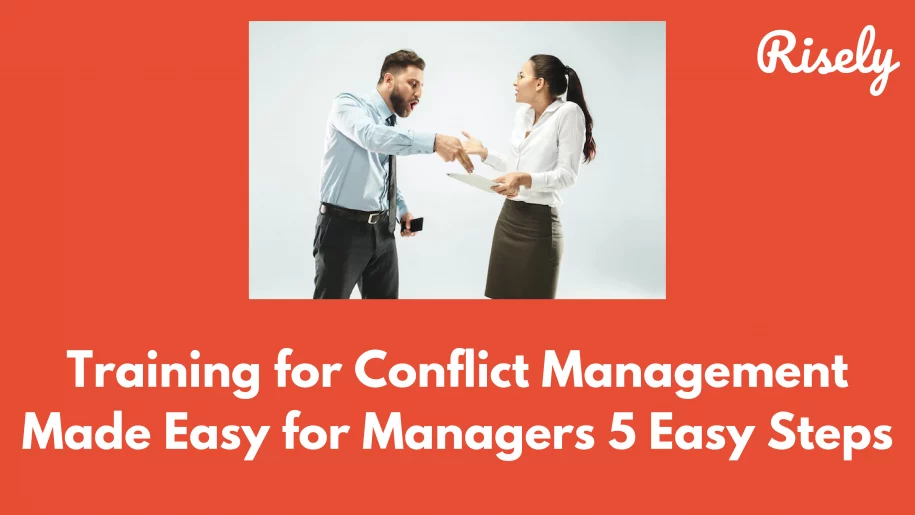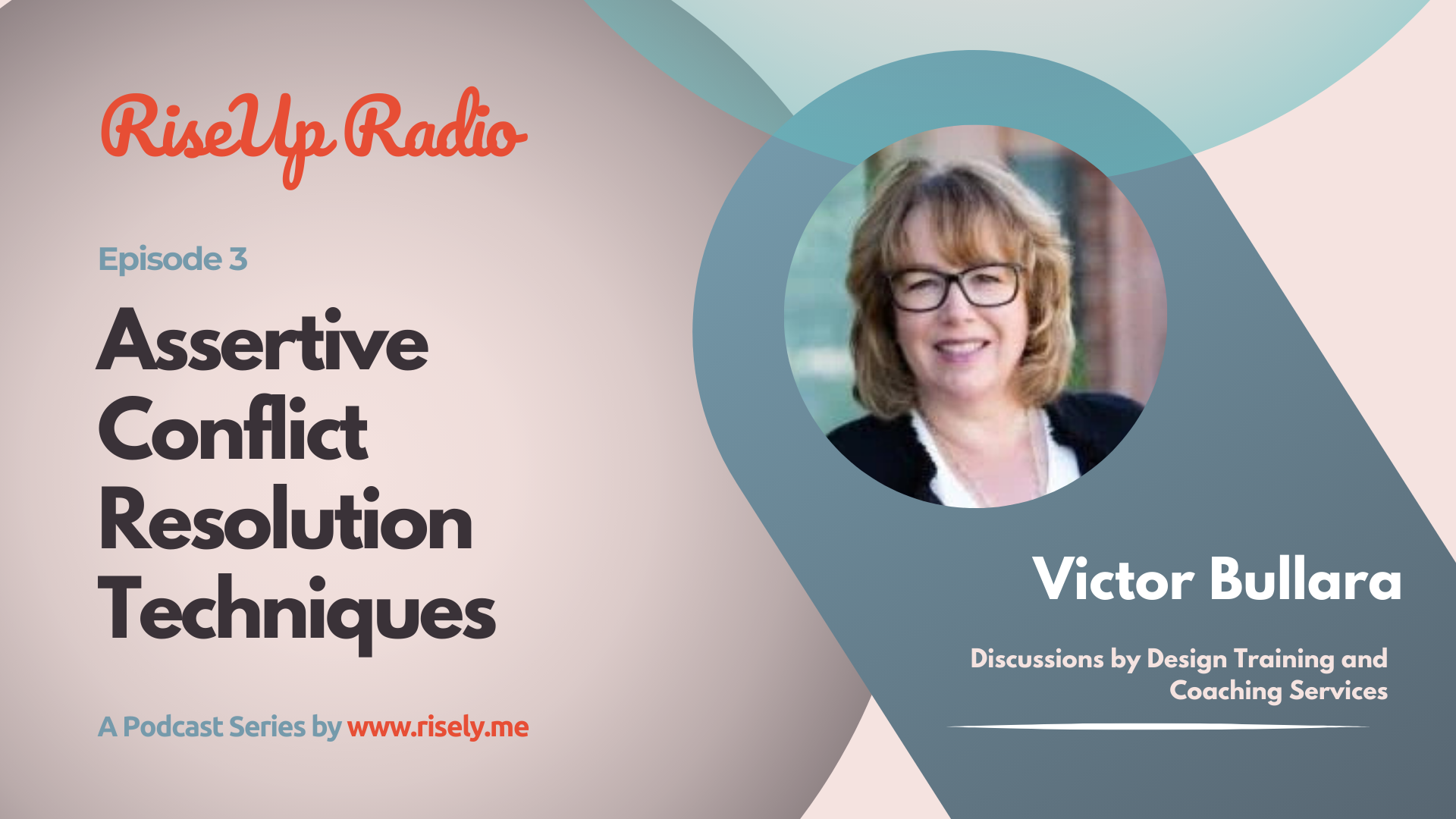Training for Conflict Management Made Easy for Managers 5 Easy Steps
Conflict is an inevitable part of life, especially in the workplace. Conflict can harm team morale and productivity, whether it’s a minor disagreement or a full-blown issue. That’s where Conflict Resolution comes in. It’s a process that allows individuals to manage their disagreements healthily and productively. In this blog, we will delve into the importance of conflict management in the workplace. We’ll highlight critical skills required for conflict management and provide five essential steps of training for conflict management that could be used with both the employees and managers.- Training for Conflict Management Made Easy for Managers 5 Easy Steps
- Importance of Conflict Management in the Workplace
- Training for Conflict Management: 5 Essential Steps
- Step 1: Assessment
- Step 2: Awareness of conflicts
- Step 3: Learning skills required for conflict management
- Step 4: Learning conflict management strategies and methods
- Step 5: Reach heights with Risely
- Conclusion
- Conflict Management Training FAQs
- Other Related Blogs
Importance of Conflict Management in the Workplace
Here are some reasons why training for conflict management is essential in the workplace:- Improved communication: Conflict management requires open and honest communication. When individuals feel heard and respected, they are more likely to engage in productive dialogue and find common ground. This can lead to better working relationships and increased collaboration.
- Increased productivity: Unresolved conflicts can create tension and distract employees from their work. When conflicts are managed effectively, employees can focus on their tasks and work together more efficiently.
- Better decision-making: When conflicts arise, there are often multiple perspectives and ideas on resolving them. Individuals can collaborate and brainstorm solutions by managing conflict effectively, leading to better decision-making and outcomes.
- Retention of employees: If conflicts are not managed effectively, employees may become disengaged, stressed, or even leave the organization. Organizations can retain talented employees and reduce turnover by managing conflicts and creating a positive work environment.
- Improved morale: Conflict can lead to negative emotions and a sense of frustration among employees. Managing conflicts effectively makes individuals feel heard and supported, leading to increased morale and a positive work environment.
- Innovation: Conflicts can sometimes be opportunities for creativity and failures and disagreements must be handled nicely to lead to innovation. When managed effectively, individuals can come up with new ideas and perspectives that may not have been considered otherwise.

Training for Conflict Management: 5 Essential Steps
Step 1: Assessment
The first step in training for conflict management is to conduct an assessment. This involves identifying the specific conflict management skills and knowledge that are required within the organization. One way to assess the training needs for conflict management is to conduct a survey. The survey can ask managers about their experiences with conflicts in the workplace, their confidence in managing conflicts, and their perceived training needs. In addition, taking especially curated psychometric assessments for conflict management skills will help you identify how good you are at managing conflicts and what areas of this skill you need to work on to improve. Example: A company noticed a rise in employee turnover and conflict-related complaints. To address this, the company surveyed its managers. It gave them assessments to understand their conflict management challenges better and identify the areas that require work. Use our free conflict management assessment to assess how good or bad you are at conflict management.Step 2: Awareness of conflicts
Once the assessments are done and improvement areas are recognized, the next step in training for conflict management is to work on increasing awareness about conflicts. Several different types of conflicts can arise due to varied reasons. Managers need to know and understand these cases in detail to be able to solve the conflicts that occur in their teams. The following means can be used for this purpose.- Provide case studies: Provide case studies that illustrate different types of conflicts and the strategies used to address them.
- Conduct role-playing exercises: Role-playing exercises can help managers gain a better understanding of the different perspectives and emotions that can be involved in conflicts.
- Provide training materials: Provide training materials that define and explain the different types of conflicts that can arise in the workplace, different styles of conflict resolution strategies at work.
Step 3: Learning skills required for conflict management
Based on the assessment, the training for conflict management should focus on developing essential conflict management skills, which are critical for making managers and leaders more efficient in handling conflicts. Here are some of the critical skills that should be focused on:- Active listening: Active listening involves entirely focusing on what the other person is saying without interrupting or making assumptions. This skill is crucial for understanding the other person’s perspective and feelings and finding common ground.
- Empathy: Empathy involves putting oneself in the other person’s shoes and trying to understand their emotions and point of view. This skill can help de-escalate conflicts and find mutually beneficial solutions.
- Communication: Communication skills, including verbal and nonverbal communication, are essential for effective conflict management. This involves clearly expressing one’s thoughts and feelings, actively listening to others, and responding appropriately.
- Problem-solving: Conflict management often involves identifying and resolving underlying issues. Effective problem-solving skills involve analyzing the situation, generating possible solutions, and evaluating the pros and cons of each option.
- Emotional regulation: Emotions can run high during conflicts, and it is vital to be able to regulate one’s own emotions and respond calmly and professionally. This can involve techniques such as deep breathing, taking a break, or reframing the situation more positively.
- Assertiveness: Assertiveness involves standing up for oneself and expressing one’s needs and opinions clearly and confidently. This skill can help prevent conflicts from escalating and ensure that one’s own needs are being met.
Other Interesting Reads
Step 4: Learning conflict management strategies and methods
The training for conflict management should also provide employees with specific conflict management strategies and methods that they can use to address different types of conflicts. This may include techniques for de-escalating disputes, finding common ground, or negotiating solutions. Here are some practical ways to do this:- Read books and articles: Explore books and articles on conflict management written by experts in the field. Look for practical guides that provide step-by-step approaches and real-life examples.
- Attend workshops and seminars: Participate in workshops or conferences on conflict management. These events often provide interactive learning experiences, case studies, and opportunities to practice conflict resolution techniques.
- Seek mentorship: Find a mentor who has expertise in conflict management. They can provide guidance, share personal experiences, and advise on effective strategies. Regular discussions with a mentor can help you develop your skills.
Step 5: Reach heights with Risely
Now that you know what to include in training for conflict management, you must be thinking about how you start doing it. Where can you begin your assessment, and who can provide all the details about conflicts and conflict management so that you can be a great manager for your team? Risely is the answer to each of your questions. Risely is an AI co-pilot with you in every step of your leadership development, giving you customized solutions and helping you make consistent progress. Remember all the essential skills we discussed, like active listening and assertiveness. We’ve got you covered on those as well. We offer free assessments for all those skills to help you understand where exactly you need to work so that you make the best use of your precious time and effort. Risely also provides you with all the essential tips and tricks for you and your teams to help you become the star manager that you have the potential to be.
Conclusion
Training for conflict management is an investment in your personal and professional growth. It equips you with the essential skills to handle difficult situations that might arise at work, in your personal life, or a social setting. Training for conflict management helps people learn how to communicate effectively, empathize with others, and find solutions to complex problems. You can become a better listener, negotiator, problem solver, and communicator with the right training program.How strong are your conflict management skills? Learn more now.
Assess your conflict management skills for free with a self-assessment to start your learning journey today.
Conflict Management Training FAQs
What is conflict management training?
Training for conflict management is a type of training that teaches individuals how to manage and resolve conflicts effectively. It typically covers communication, negotiation, problem-solving, and mediation. This type of training can be beneficial in both personal and professional settings. Conflict management training aims to equip individuals with the skills they need to handle conflicts constructively and positively, reducing stress and facilitating healthy relationships.
What are the five conflict management strategies?
The five conflict management strategies are accommodating, avoiding, collaborating, competing, and compromising. Accommodating involves giving in to the other party’s needs or desires while avoiding involves ignoring or postponing the conflict. Collaborating involves finding a mutually beneficial solution, whereas competing involves asserting one’s needs and desires over the other party’s. Finally, compromising involves both parties giving up something to resolve. By understanding these strategies, you can better navigate conflicts and find a solution for all parties involved.
How do you train employees in conflict management?
To train employees in conflict management, consider offering regular conflict resolution training that teaches effective communication and active listening skills. Role-playing scenarios can also help employees practice their conflict-resolution skills. Encourage employees to seek mediation or involve a neutral third party if a conflict cannot be resolved internally. By providing ongoing education and support for conflict management, your employees will be better equipped to handle disputes productively and positively.
Other Related Blogs
Assertive Conflict Resolution Techniques | Brenda Hooper
Assertive Conflict Resolution Techniques | Brenda Hooper Can assertive communication help you out in resolving conflicts? In this podcast conversation, we have Brenda Hooper, an experienced executive coach joining us…
7 Conflict Resolution Scenarios At Work For Practice
Conflict resolution is one of the most important people management skills you must master. If conflicts on your team go unresolved, you must wait with bated breath for them to…
Conflict Coach 101: A Beginner’s Guide
Conflict Coach 101: A Beginner’s Guide Did you know? Since 2008, we have doubled the hours we spend in conflicts at work. Research by the Myers-Briggs Company suggests that an…
5 Secrets To Conflict Resolution At Work For Managers
5 Secrets To Conflict Resolution At Work For Managers Conflict is all too common. We often encounter this ever-present demon in our workplaces, too. The trouble is manifold for managers…


